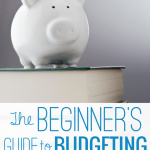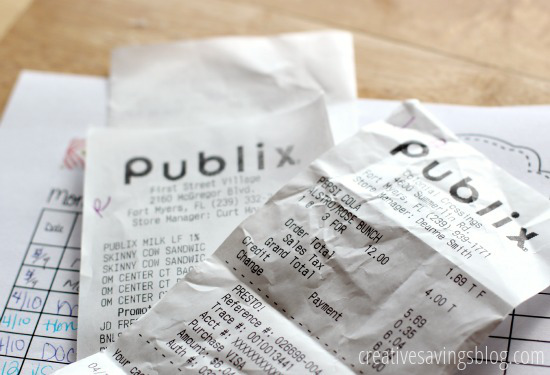I Have A Budget…Now What? (3 Simple Ways to Maintain It)
This is the sixth post in the Creative Savings’ Beginners Guide to Budgeting Series. To read all posts in order, start with Why You Need a Budget, then continue reading the rest of the series on this page.
Congrats on making it this far in our budgeting series!
This is some tough stuff we’ve worked through the past few weeks {I’ve been reworking my budget right alongside you}, and I’m proud of you for sticking with it. It’s such a relief knowing we’re on the right track, isn’t it?
But budgeting doesn’t just end with a budget sheet, or a detailed money management system. Nope, we have to continually maintain it, which might be the hardest part yet. Don’t give up though – you can totally keep that budget mojo going, and boost your finances to be as successful as possible.
These 3 simple steps will help!
1. Continue Tracking Expenses
When we started tracking our expenses toward the beginning of this series, it was so you could get a better picture of your spending habits, catch the “leaks”, and know exactly where to cut.
Budgets can change, and you need to reevaluate yours {especially in the beginning}, just to make sure your monthly budget numbers align with what you’re actually spending.
Usually a quick glance at your Expense Tracker will identify specific problem purchases if you end up negative in any of your Account Tracker categories.
For example, you might feel like you’re trying to squeeze yourself into a Food budget that is way too tight, but after looking at your Expense Tracker, you may find that most of your purchases were for eating out. Instead of adding to the Food budget, consider cutting back to reduce the entire expense column. If however, you look at your Expense Tracker and you only ate out once, you may need to cut back in another area to compensate for the change.
Reworking your budget at this stage doesn’t mean you did it wrong, it just means you’re fine tuning it so the numbers reflect your actual expenses as much as possible.
2. Stay Organized
The key to making your budget work isn’t just self-discipline, it’s also organization.
Without organization, any budget routine or process that you use {even this one}, will become completely useless. Be sure to develop and maintain a flow when recording transactions, filing away receipts, and balancing accounts, because if you don’t, the work will pile up until it’s entirely too overwhelming to attempt.
I once went 10 months without tracking receipts because I couldn’t stand the though of sorting through that massive stack. They sat very nicely in our pretty receipt tray, but I never made time to sit down and actually record them!
Now we have a system where every receipt gets immediately entered into the Expense Tracker {which hangs on our fridge}, then placed on my desk to record in our Account Trackers. I hate it when my desk is filled with clutter, so I always make sure to enter these receipts every 3-4 days, just to keep the surface clear.
Another idea is to start a financial notebook to hold all your important documents in one place, then set up regular budget meetings with your spouse to keep you accountable and talk over ways to save, spend, and generally make sure you’re on track.
Want more? Check out more than 60 great ideas that I’ve compiled for you on how to manage money better.
3. Creatively Use Your Leftover Category
Unless every single penny is going towards your budgeted expenses, you’re going to have some leftovers.
A tight budget might have a miscellaneous or “leftover” category that catches $5 or $10 of each paycheck at first, but after you’ve learned to cut down on your expenses, you’re going to see this column increase.
The fun begins when you can then split this category after a couple months of budgeting, thus creating new categories to help you save toward specific goals.
Here are some examples:
- Emergency Fund
- Vacation Fund
- Big Purchase Fund {for new furniture or appliances}
- Down Payment Fund
- New Car Fund
- Extra Credit Card/Loan Payments
- Personal Allowances or FUN Money
None of the above categories are a necessity per se, but it’s wonderful to have extra padding in addition to your “have-to” expenses.
Managing a budget will get easier the more you do it, and pretty soon you’ll be amazed at all the things you can accomplish because you actually have one.
You’ll never be caught off guard by another expense, and this “financial roadmap” will guide you through not only paying off debts, but also saving up for what you really need and want. Daily practice and persistence will help you maintain success!




Hi there Kaylyn!
I just found your blog via Pinterest for meal planning… next thing I know I’m reading your life changing plan of budget, can we get an “Alleluia”?!
I am a new wife/mommy and we are S-L-O-W-L-Y getting it together regarding budget. I have been trying to get our fiancees in order for quite some time, but it’s like 2 steps forward- 11 steps back. I’ve been reading Steve Ramsey, I’ll watch Suze Orman every Saturday night- and I feel more confident in the why and how- but in a practical sense, I’ve been feeling so stifled!
So finding your step-by-step journey to financial responsibility/organization is just wonderful. Thank you!!
I plan to print out all your cutely organized sheets and getting things organized. I definitely need to reread things. Please forgive me if I missed this; but I was wondering something. With my fixed/unfixed bills set and there’s leftover money, how do you personally suggest how to determine what percentage goes to food/groceries. My goal is for us to cook at home more; however just like you mentioned, I’ll end up spending so much at the store! So I wanted to see what works for you/any suggestions you have regarding how much/what percentage of the monthly budget should go towards grocery budget.
Lastly, are you familiar with the 50-20-30 rule in preparing a budget breakdown? Thanks so much for your great blog! Keep up the awesomeness!
Gratefully,
Josephine
THANK YOU! What a unselfish, giving act you have created. I realize after I read this series how toxic my relationship is with money and budgeting. This is great for people who have ADHD/ ADD. I even schedule TUES/THURS/ SAT as days to focus on my budget.
One question, what percentage should one spend for housing? I know this sounds silly, but I need to determine if I’m spending too much money in rent. Thank you so much Kalyn. Your parents did a wonderful job with handing you the tools to be an awesome budget- er and a more awesome giving person.
I have heard so many different thoughts on housing percentages lately, but here’s the gist of it:
It used to be 30% of your monthly income should on housing, but honestly, these days it is so hard to find a rental or mortgage for that cheap! When we bought our house here in FL, the bank counted 40%, but I think that is too much. I’d try to settle around 35% if you can, and perhaps bump it up to 37% if you need to.
I hope that helps, and thank you so much for your kind words. I’m super excited this series is helping you get back on track!
The best thing i have done for our budget is auto-savings. Its written down like a bill when I do our finances. I am saving for a weekend getaway (sans kids) with my husband!
That’s such a great way to save — enjoy your getaway!